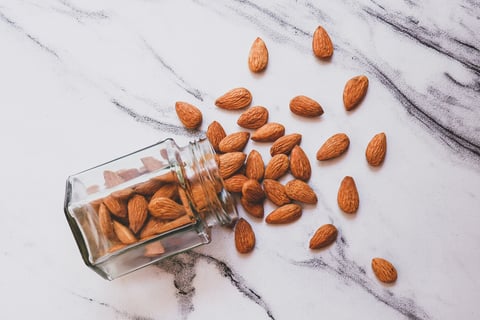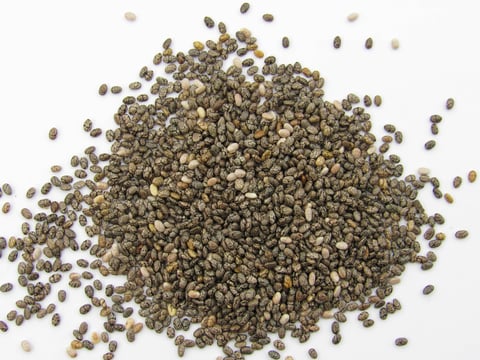Superfoods for Busy Professionals: Part 1 – The First 5 Energy & Immunity Boosters
For many busy professionals, long work hours, stress, and an on-the-go lifestyle lead to poor nutrition choices, energy crashes, and weakened immunity. But the solution isn’t just drinking more coffee—it’s fueling your body with the right foods to sustain energy, boost focus, and keep your immune system strong. Enter superfoods—nutrient-dense powerhouses that provide essential vitamins, minerals, and antioxidants to help you perform at your best. This two-part series covers 10 scientifically-backed superfoods that seamlessly fit into a hectic lifestyle. Part 1 features the first five, complete with their history, benefits, interesting trivia, and easy ways to incorporate them into your day.
DIET & NUTRITION


Superfoods for Busy Professionals: Part 1 – The First 5 Energy & Immunity Boosters
The Busy Professional’s Guide to Better Energy & Immunity
It’s Monday morning, and you’re rushing to a meeting—no time for breakfast, just coffee. By 2 p.m., your energy crashes, your mind is foggy, and you’re struggling to stay focused. Sound familiar?
For many busy professionals, long work hours, stress, and an on-the-go lifestyle lead to poor nutrition choices, energy crashes, and weakened immunity. But the solution isn’t just drinking more coffee—it’s fueling your body with the right foods to sustain energy, boost focus, and keep your immune system strong.
Enter superfoods—nutrient-dense powerhouses that provide essential vitamins, minerals, and antioxidants to help you perform at your best.
This two-part series covers 10 scientifically-backed superfoods that seamlessly fit into a hectic lifestyle. Part 1 features the first five, complete with their history, benefits, interesting trivia, and easy ways to incorporate them into your day.
1. Blueberries – The Brain Booster
History & Background
Blueberries have been eaten for thousands of years, originally used by Native American tribes for both food and medicine. They referred to them as “star berries” due to their five-pointed blossom shape. Traditionally, blueberries were dried and stored for winter, used in pemmican (a high-energy food mix) and herbal remedies to treat infections.
It wasn’t until the 20th century that blueberries were cultivated commercially, gaining attention for their high antioxidant content and brain-boosting properties.
Why It Works
Blueberries are often referred to as “brain berries” due to their impressive nutrient profile, which supports mental clarity, cognitive function, and immune health. These small but mighty fruits are packed with antioxidants, vitamin C, and fiber, making them an excellent superfood for professionals who need to stay sharp, focused, and resilient against illness.
One of the key components that make blueberries so beneficial is their high antioxidant content, particularly flavonoids. These compounds help reduce oxidative stress in the brain, which is closely linked to memory decline and cognitive fatigue. Oxidative stress occurs when there is an imbalance between free radicals and antioxidants in the body, leading to cellular damage and mental sluggishness. For professionals juggling multiple tasks, long meetings, and heavy workloads, mental exhaustion can significantly impact productivity. Regular consumption of blueberries has been shown to enhance memory, improve learning capacity, and support long-term brain health.
Beyond cognitive function, blueberries are also a powerhouse for the immune system. Their high vitamin C content plays a vital role in stimulating white blood cell production, which helps the body fight infections and recover from illness more efficiently. Vitamin C is also involved in collagen production, which keeps skin healthy and supports faster tissue repair, making blueberries a great addition to any diet for overall wellness and longevity.
Additionally, blueberries provide a good source of fiber, which aids in digestion and blood sugar regulation. Stable blood sugar levels contribute to consistent energy levels throughout the day, preventing the crashes that can occur after consuming processed snacks or high-sugar foods.
For professionals who often experience brain fog, fatigue, or immune challenges, incorporating blueberries into their diet is a simple and delicious way to support cognitive function, enhance energy stability, and strengthen immune resilience. Whether eaten fresh, frozen, blended into smoothies, or mixed into morning oatmeal, blueberries offer a powerful nutritional boost to help keep the mind and body performing at their best.
Interesting Trivia
Blueberries were one of the first foods to be freeze-dried and sent into space as astronaut food by NASA! Their high nutrient density made them a perfect space snack.
How to Add It to Your Routine
• Morning boost: Add blueberries to oatmeal, yogurt, or whole-grain cereal.
• Snack smart: Keep dried blueberries in your bag for a quick energy pick-me-up.
• Brain fuel smoothie: Blend with Greek yogurt, chia seeds, and almond milk for a nutrient-dense drink.
🔗 Scientific Backing: Flavonoids in blueberries enhance brain function and immune response. Medical News Today
2. Spinach – The Stress Shield
History & Background
Spinach originated in ancient Persia (modern-day Iran and Afghanistan) and was introduced to Europe by Arab traders in the 9th century. It became popular in the Mediterranean diet and was praised for its health benefits by Catherine de’ Medici, Queen of France, who demanded spinach at every meal—hence the term “Florentine” in French cuisine.
Spinach gained worldwide popularity in the 20th century, thanks in part to Popeye the Sailor, whose exaggerated strength after eating spinach reinforced its reputation as a nutritional powerhouse.
Why It Works
Spinach is often regarded as a nutritional powerhouse, and for good reason. It is rich in iron, folate, and essential vitamins A, C, and E, making it an ideal superfood for those looking to boost energy, support immune function, and combat stress-related fatigue.
One of the key benefits of spinach is its iron content, which plays a crucial role in the production of red blood cells. Red blood cells are responsible for transporting oxygen throughout the body, ensuring that muscles and the brain receive adequate oxygen supply to function optimally. Without sufficient iron, the body struggles to maintain energy levels, leading to fatigue, brain fog, and reduced productivity—issues commonly faced by busy professionals managing long work hours.
In addition to iron, folate (vitamin B9) in spinach helps in DNA synthesis and cell repair, supporting overall cellular energy production. This is particularly important for those who experience chronic stress or mental fatigue, as folate plays a role in neurotransmitter function and brain health.
Spinach is also packed with vitamin C and beta-carotene, two powerful antioxidants that help strengthen the immune system and fight off infections. Vitamin C is known to stimulate white blood cell activity, which is essential in defending the body against illnesses, while beta-carotene protects cells from oxidative damage caused by environmental stressors.
Another notable component of spinach is its high magnesium content, which aids in reducing stress-related fatigue. Magnesium plays a critical role in muscle relaxation, nervous system regulation, and energy metabolism, helping to maintain steady energy levels throughout the day. Many professionals experience stress-induced fatigue or tension headaches, and ensuring adequate magnesium intake through spinach can help alleviate these symptoms naturally.
For individuals who often feel mentally and physically drained, incorporating spinach into their daily diet can be a simple yet effective way to improve overall energy levels, cognitive function, and immune resilience. Whether consumed in a salad, smoothie, or sautéed dish, spinach provides a nutrient-dense solution to daily fatigue and stress.
Interesting Trivia
The famous phrase “Popeye Effect” comes from a decimal point error in a 19th-century scientific paper, which overestimated spinach’s iron content by a factor of ten!
How to Add It to Your Routine
• Power lunch: Toss spinach into salads, sandwiches, or grain bowls.
• Blended nutrition: Add it to smoothies—its mild taste makes it almost undetectable.
• Quick side dish: Sauté spinach with olive oil, garlic, and a sprinkle of sea salt for a nutrient-packed dinner.
🔗 Scientific Backing: Leafy greens like spinach enhance immunity and energy levels. Brown Health
3. Almonds – The Meeting-Ready Snack
History & Background
Almonds are among the oldest cultivated nuts, dating back 5,000 years to regions like Persia, Turkey, and the Middle East. They were prized by ancient Egyptians and Romans, who considered almonds a symbol of health and good fortune.
By the Middle Ages, almonds had become a staple in European diets, often used in almond milk—a precursor to the plant-based milk trend we see today.
Why It Works
Almonds may be small, but they pack a powerful nutritional punch, making them one of the best superfoods for sustained energy, immune support, and blood sugar regulation. Often referred to as nature’s energy booster, almonds are rich in magnesium, vitamin E, and healthy fats, all of which play crucial roles in keeping busy professionals alert, energized, and resilient against stress and fatigue.
One of the primary reasons almonds are so effective at reducing exhaustion is their high magnesium content. Magnesium is essential for energy metabolism, as it helps the body convert food into usable energy. A deficiency in magnesium is often linked to muscle fatigue, weakness, and sluggishness—symptoms many professionals experience when working long hours. By providing a natural source of magnesium, almonds help keep energy levels steady throughout the day, preventing the dreaded afternoon slump.
In addition to their energy-enhancing benefits, almonds are also an excellent source of vitamin E, a potent antioxidant that plays a critical role in immune function. Vitamin E helps combat free radicals, which are unstable molecules that can cause cellular damage and weaken the immune system. Regular consumption of almonds can help fortify the body’s natural defenses, making it easier to fight off colds, infections, and other illnesses that could disrupt productivity.
Another key benefit of almonds is their ability to regulate blood sugar levels, which is essential for maintaining consistent energy and focus. The healthy fats, fiber, and protein in almonds work together to slow the absorption of sugar into the bloodstream, preventing the rapid spikes and crashes that often occur after consuming processed snacks or high-carb meals. This means fewer energy crashes, brain fog, and cravings, allowing professionals to stay focused and productive for longer periods.
For those looking for a quick, nutritious snack that supports both energy and immunity, almonds are an ideal choice. Whether eaten raw, roasted, blended into almond butter, or added to salads and yogurt, almonds provide a convenient and effective way to stay fueled, focused, and resilient throughout the day.
Interesting Trivia
Almond trees are related to peach and apricot trees—in fact, an almond is technically not a nut but a seed inside the fruit of the almond tree!
How to Add It to Your Routine
• Portable snack: Keep a handful of almonds in your work bag.
• Healthy breakfast: Add to Greek yogurt or oatmeal for extra crunch.
• Nut butter boost: Spread almond butter on whole-grain toast for a protein-packed start to your day.
🔗 Scientific Backing: Almonds support immune function and energy metabolism. Brown Health
4. Greek Yogurt – The Gut Health Guardian
History & Background
Greek yogurt, also known as strained yogurt, has been a dietary staple for thousands of years, originating in ancient Greece and the Middle East. Unlike regular yogurt, Greek yogurt is strained multiple times, removing excess liquid whey and resulting in a thicker, protein-rich dairy product.
Historically, Greek yogurt was developed by fermenting milk in warm climates, creating a nutrient-dense food that could be stored longer and provided essential nourishment. It was a key part of Mediterranean diets, praised for its gut-supporting properties and high protein content.
Greek yogurt gained global popularity in the 20th century, especially as health research highlighted its probiotic benefits and its role in supporting digestive health and immunity.
Why It Works
Greek yogurt is a nutrient-dense powerhouse, providing a unique combination of probiotics, protein, and essential vitamins that support gut health, energy stability, and immune resilience. Unlike regular yogurt, Greek yogurt undergoes an extra straining process, which removes excess whey, resulting in a thicker texture, higher protein content, and a lower sugar profile.
One of the standout benefits of Greek yogurt is its high concentration of probiotics—beneficial bacteria that promote a healthy gut microbiome. Since 70% of the immune system resides in the gut, maintaining a well-balanced microbiome is crucial for fighting infections, reducing inflammation, and improving digestion. A healthy gut allows the body to absorb nutrients more efficiently, ensuring that professionals get the most out of their meals to sustain peak energy and cognitive function.
Beyond its immune-boosting properties, Greek yogurt is also a high-protein food, making it a fantastic energy stabilizer. Protein helps prevent blood sugar crashes, which often lead to mid-day fatigue, sluggishness, and difficulty concentrating. For professionals who rely on consistent energy levels to power through long meetings, tight deadlines, and demanding schedules, Greek yogurt offers a steady source of fuel without the spikes and dips associated with high-carb or sugary snacks.
In addition to probiotics and protein, Greek yogurt is rich in calcium, vitamin B12, and potassium—three essential nutrients that contribute to strong bones, nerve function, and sustained energy production. Calcium helps maintain bone density and muscle function, vitamin B12 supports red blood cell production and brain health, and potassium plays a role in hydration, nerve signaling, and electrolyte balance—all of which are crucial for staying physically and mentally sharp throughout the day.
For professionals seeking an easy, nutritious option that supports digestion, boosts immunity, and stabilizes energy, Greek yogurt is an ideal choice. Whether eaten on its own, topped with fruit and granola, blended into smoothies, or used as a base for salad dressings and dips, Greek yogurt provides a versatile and delicious way to fuel productivity and overall well-being.
Interesting Trivia
Greek yogurt was so highly valued in ancient Greece that it was often used as a remedy for digestive ailments and was even applied topically on burns and wounds due to its cooling properties!
How to Add It to Your Routine
• Breakfast boost: Add fruit, honey, and granola for a well-rounded meal.
• Smart snacking: Replace sugary snacks with a cup of Greek yogurt.
• Versatile ingredient: Use as a base for smoothies, salad dressings, or dips.
🔗 Scientific Backing: Probiotics in yogurt enhance immune response and improve gut health. Mayo Clinic Press
5. Chia Seeds – The Hydration and Energy Stabilizer
History & Background
Chia seeds are derived from the plant Salvia hispanica, native to Central and Southern Mexico. Historically, they were a staple in the diets of ancient civilizations such as the Aztecs and Mayans, valued for their ability to provide sustainable energy. The word “chia” even translates to “strength” in the Mayan language. These tiny seeds were not only consumed as food but also used in religious ceremonies and medicinal applications.
Why It Works
Chia seeds may be tiny, but they pack a nutritional punch that makes them a superfood for energy, hydration, and overall health. These ancient seeds, once a staple in Aztec and Mayan diets, were prized for their ability to sustain energy and endurance—a benefit that remains just as relevant for today’s busy professionals.
One of the key reasons chia seeds are so effective at maintaining steady energy levels is their high fiber content, which consists mostly of soluble fiber. When mixed with liquid, chia seeds absorb up to 10 times their weight in water, forming a gel-like consistency. This process slows digestion, allowing for a gradual release of nutrients and sustained energy throughout the day. Unlike high-sugar snacks that cause rapid energy spikes and crashes, chia seeds help stabilize blood sugar levels, making them an ideal choice for preventing mid-day fatigue.
Beyond their energy-enhancing properties, chia seeds are also an excellent source of omega-3 fatty acids, which support cardiovascular health, brain function, and inflammation reduction. Omega-3s are essential for maintaining healthy blood circulation, ensuring that oxygen and nutrients reach the brain and muscles efficiently. For professionals who spend long hours at a desk, consuming adequate omega-3s can help improve focus, cognitive performance, and overall mental clarity.
Another standout feature of chia seeds is their hydrating ability. Because they absorb and retain water, chia seeds help maintain hydration levels, which is crucial for sustaining energy, preventing headaches, and supporting bodily functions. Proper hydration is often overlooked, yet it plays a key role in physical endurance and mental alertness. Including chia seeds in a daily routine ensures that the body stays well-hydrated, reducing the risk of energy slumps due to dehydration.
For those looking for an easy and effective way to boost energy, stay hydrated, and support heart and brain health, chia seeds are a simple yet powerful solution. Whether stirred into water, blended into smoothies, sprinkled onto yogurt, or used to make chia pudding, these nutrient-dense seeds provide long-lasting energy and hydration to fuel even the busiest of days.
Interesting Trivia
In the 1980s, chia seeds gained popularity in the United States through “Chia Pets,” terracotta figurines that sprouted chia seeds to resemble animal fur or hair. These novelty items brought chia seeds into the spotlight long before their health benefits were widely recognized.
How to Add It to Your Routine
• Hydrating Beverage: Mix a tablespoon of chia seeds into a glass of water with a squeeze of lemon. Let it sit for 10-15 minutes until it forms a gel-like consistency, then drink it to stay hydrated and energized.
• Breakfast Addition: Sprinkle chia seeds over your cereal, yogurt, or oatmeal to add a nutritional boost.
• Baking Ingredient: Incorporate chia seeds into muffins, bread, or homemade granola bars for added texture and nutrients.
🔗 Scientific Backing: Chia seeds are packed with nutrients that may support numerous health benefits, including reducing blood pressure, lowering cholesterol levels, and supporting digestive health. Harvard Health.
Conclusion
In this first part of our Superfoods for Busy Professionals series, we explored five powerful foods that can boost energy, enhance focus, and strengthen immunity. By incorporating blueberries, spinach, almonds, Greek yogurt, and chia seeds into your daily routine, you can combat fatigue, stay sharp, and maintain peak performance without relying on caffeine and processed snacks.
But we’re not done yet! In Part 2, we’ll uncover five more game-changing superfoods, including turmeric, dark chocolate, and green tea, that will further elevate your energy levels and immune resilience. Stay tuned!











